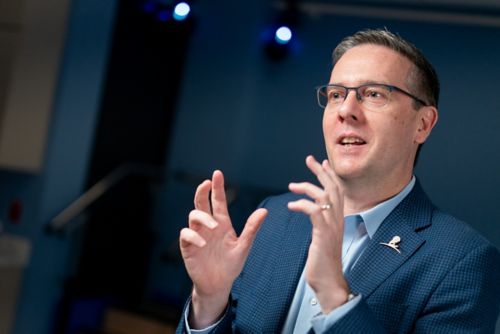St. Jude Family of Websites
Explore our cutting edge research, world-class patient care, career opportunities and more.
St. Jude Children's Research Hospital Home

- Fundraising
St. Jude Family of Websites
Explore our cutting edge research, world-class patient care, career opportunities and more.
St. Jude Children's Research Hospital Home

- Fundraising
Joshua Burns, PhD
Restoring function to survivors of childhood cancer and those living with genetic neurologic diseases through precision measurement and personalized health care
Overview
Walking speed, considered a functional vital sign, correlates with daily living activities, wellbeing and quality of life. For children with peripheral nerve disorders, disruptions to gait — or the coordinated movements of walking — can become debilitating. Children with inherited neuropathy, such as Charcot-Marie-Tooth disease (CMT), develop muscle weakness, sensory loss and impaired balance that leads to debilitating mobility issues.
Likewise, children with acquired neuropathy from cancer therapies such as vincristine can experience muscle weakness, foot deformities and balance issues that can impact mobility. By intervening early — during chemotherapy or around the time of tumor resection surgery — we intend to mitigate or prevent some of these debilitating side effects.
By understanding and addressing the root cause of mobility issues in pediatric cancer and neurologic diseases, we can intervene early and monitor progress over time to improve quality of life.

Research Summary
I have devoted my career to exploring gait deficits and other movement disorders, primarily in children. My team measures and manages peripheral neuropathy as well as the mobility-related impacts of catastrophic pediatric diseases.
As Director of the Disability Prevention Program, which encompasses the Gait & Mobility Lab, our team uses 3D motion analysis protocols to assess patients’ motor function. We collaborate with the Center for Experimental Neurotherapeutics (CENT) to design and validate functional outcome measures for precision medicine trials and explore new digital health technologies, such as wearable inertial sensors, to measure how patients respond to therapies at home and in the community.
We work closely with Dr. Kirsten Ness and the Human Performance Lab, which evaluates the function of long-term pediatric cancer survivors as part of the St. Jude LIFE study and conducts clinical trials of rehabilitative interventions to increase physical activity. While the Human Performance Lab conducts a range of assessments to understand the full physical spectrum, the Gait & Mobility Lab uses the most advanced technology available to assess walking ability over time. What we measure in both the Human Performance Lab and Gait & Mobility Lab will help physicians and therapists better manage the physical condition of pediatric cancer patients, childhood cancer survivors and children with neurologic disorders.
Data collected in the Gait & Mobility Lab will leverage data from the 1000 Norms Project, an ongoing research program established in 2014. The clinical catalog of human variation includes over one million age- and sex-specific normative reference values for common functional outcome measures that assess key aspects of motor function in everyday life. Researchers worldwide have used the database — available at www.ClinicalOutcomeMeasures.org — to develop clinical outcome measures for a range of neurological and musculoskeletal disorders.
As the Gait & Mobility Lab evolves, we plan to develop a Global Certification Standard to enable study sites worldwide to accurately and reliably perform gait assessments developed in the lab. Doing so will allow us to expand our research and help more patients who experience debilitating nerve, muscle and brain disorders across the lifespan.

Selected Publications
About Joshua Burns

Dr. Joshua Burns is the Jeweler’s Charity Fund Endowed Chair and Director of the Disability Prevention Program in the Department of Epidemiology and Cancer Control. His clinical research interests focus on precision measurement and personalized health care for pediatric patients with neurological diseases and for childhood cancer survivors. Dr. Burns’ contributions to the field have earned him Fellowship of the Royal College of Physicians and Surgeons of Glasgow (Faculty of Podiatric Medicine) and Fellowship of the Australian Academy of Health and Medical Sciences.
Dr. Burns served as Dean of the University of Sydney School of Health Sciences before moving his research program to St. Jude Children’s Research Hospital. He received First Class Honors and the University Medal in Podiatry, a PhD in Physiotherapy, and completed postdoctoral training in Neuromuscular Disorders and Biomechanics at the Sydney Children’s Hospitals Network in Australia. In 2009, he was a Fulbright Scholar studying Peripheral Neuropathy at Wayne State University School of Medicine in Detroit Michigan.
Affiliations and collaborations
Contact us
Joshua Burns, PhD
Member, St. Jude Faculty
Department of Epidemiology & Cancer Control
Director, Disability Prevention Program
Jeweler's Charity Fund Endowed Chair in Cancer Survivorship
St. Jude Children's Research Hospital

Memphis, TN, 38105-3678 USA GET DIRECTIONS